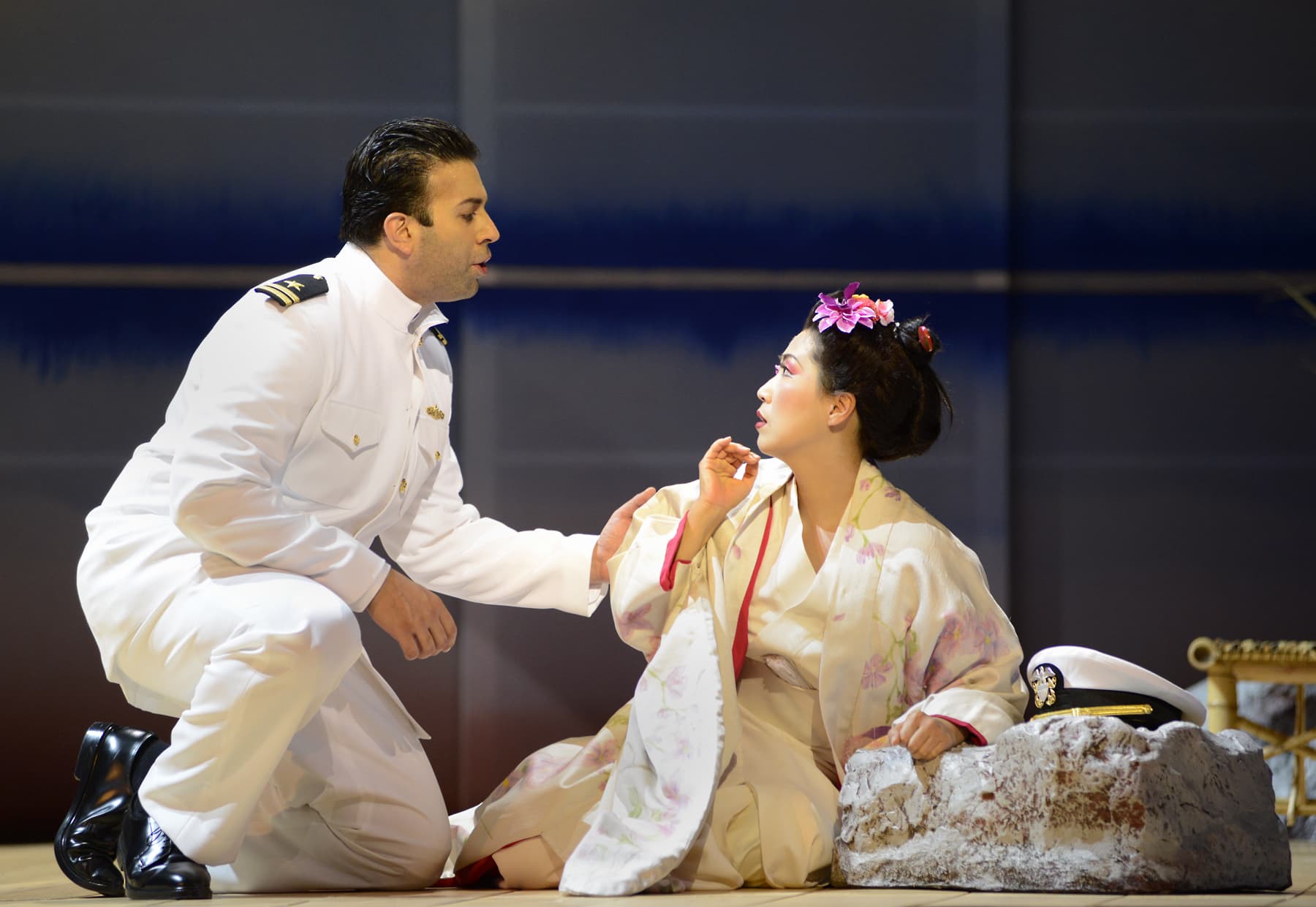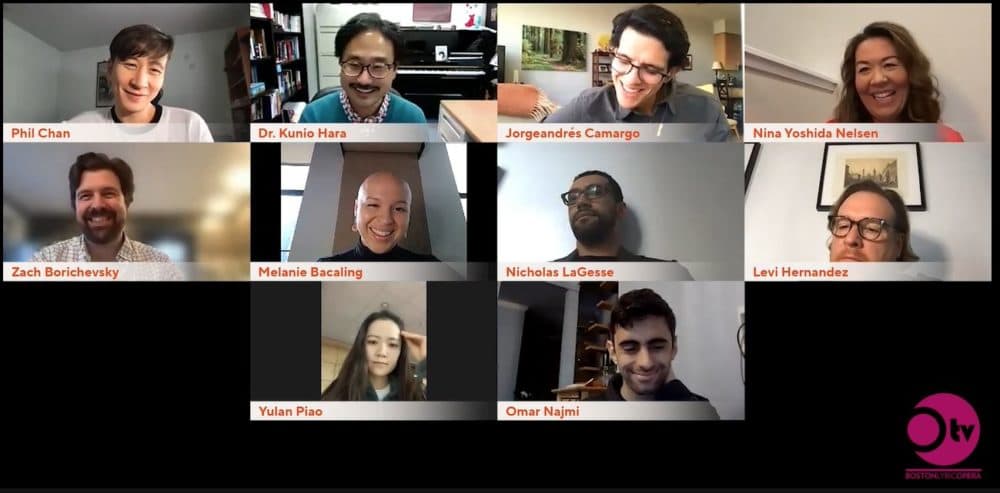Advertisement
Boston Lyric Opera reexamines Puccini's 'Madama Butterfly' through cultural discussion series

How do we approach works of art that were written in a time when stereotypes of non-Western cultures were widely accepted? How do we come to understand them now? These are questions that Boston Lyric Opera’s discussion series, “The Butterfly Process,” endeavors to address, by reexamining Puccini’s popular opera “Madama Butterfly” and opening a conversation about its history, legacy and how it can be interpreted today, particularly in light of heightened anti-Asian racism in the world. Through a sequence of talks, artists, guest speakers and the broader community examine how we can look at operas from the core canon that, though cherished, demand a conversation about race, while still carrying artistic value or merit.
The idea for “The Butterfly Process” came about after BLO’s intended staging of “Madama Butterfly,” scheduled to open in the fall of 2020, was canceled due to the COVID-19 pandemic. It was pushed to the following autumn, but in early 2021, the team began “reevaluating what productions we were putting on our stage and what stories we were telling,” said Bradley Vernatter, acting Stanford Calderwood general and artistic director. He added that as these explorations continued, “We realized we were not in a position to present a respectful production of ‘Butterfly’ this fall.” Instead, they decided to put together a series that would navigate the challenges people had with its traditions, with discussions beginning in December of 2021 and ending in May 2022. Phil Chan, a moderator for the talks and the co-founder and author of “Final Bow for Yellowface,” said that he wishes for productions of “Madama Butterfly” to be reimagined, not canceled.
"If you think about works in the performing arts as living rituals that we perform, versus static art, like a film, a sculpture, or a painting, those things capture the zeitgeist of the moment."
Phil Chan
“Our approach is very much saying, works like ‘Madama Butterfly’ are beautiful … they can bring a new audience, and there’s some stunning work there,” said Chan. “But there are some problematic elements to them. So what do we do, to keep it fresh, to keep it alive? If you think about works in the performing arts as living rituals that we perform, versus static art, like a film, a sculpture, or a painting, those things capture the zeitgeist of the moment. You can’t put a mustache on the Mona Lisa. But every time we decide to do ‘A Midsummer Night’s Dream,’ we’re saying it a little differently. Different parts resonate at different moments.”
The first conversation featured guest Kunio Hara, a professor at the University of South Carolina, whose interests include Puccini’s operas. During the discussion, speakers addressed the caricatures and depictions of geishas in “Madama Butterfly,” pointing out that some of these representations may have come out of Western anxiety about Japan’s emergence as a military power. Even during World War II, Vernatter later said, productions of “Madama Butterfly” were canceled in the United States because they painted “too sympathetic” a picture of Japanese people. Zach Borichevsky, who was intended to play Pinkerton in BLO’s unrealized performance, said that earlier versions of the opera present the naval officer as racist, a portrayal that reduces Butterfly’s, or Cio-Cio-San’s, agency, seeing as she falls in love with him.

What Vernatter sees as a more empowering representation of Cio-Cio-San is to be found in productions that are committed to the journey of the title character, which listeners and spectators have connected with over the years.
“The piece really does explore the depths of emotion of this character. It centers on Cio-Cio-San. It really is her story,” said Vernatter. “It beautifully and powerfully explores this entire range of emotion of this woman. Productions of it have fallen victim to some tropes, to stereotypes, but that’s not the core of the piece. It’s the emotional experience of Butterfly that captures us as an audience.”
Nina Yoshida Nelsen is a mezzo-soprano who was originally meant to perform the role of Suzuki, Cio-Cio-San’s maid and friend. For her, she said that caricatures seen throughout history of how Japanese women act and behave have led to incidences of hatred and violence, pointing to recent cases in the United States. While “Madama Butterfly” has a history of contributing to negative perceptions of Asian women, it remains popular because of the beauty of its music, the passion of its lead character, and ultimately, the sacrifice that she makes. To more sensitively produce stories like “Madama Butterfly,” we need to reach into its emotional core, Nelsen said.
Advertisement
"I think the most important thing is, we are playing real relationships, real people, and real human emotions and feelings."
Nina Yoshida Nelsen
“We go back to telling the story of humanity. It’s a human story, rather than a cultural story,” she said. “For me, that is the first step in producing these operas more responsibly. … I think the most important thing is, we are playing real relationships, real people, and real human emotions and feelings.”
The next talk, held on Jan. 18, will focus on “Orientalism and Cultural Appropriation,” exploring how Orientalism has influenced Western European art and “reinforced specific and narrow attitudes of AAPI people and cultures.” Another discussion, held in February, will focus on the experiences of artists, while the subject of the BLO's March 8 conversation will highlight “Symbolism and Archetypes of Women.” An April 5 panel will unpack casting processes, and at the end of May, there will be an in-person, public town hall discussing what was learned throughout "The Butterfly Process."
